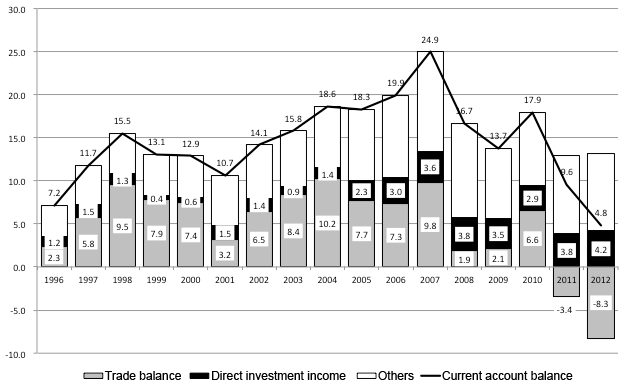Japan's current account balance and direct investment income
Outstanding foreign direct investment (FDI) by Japanese companies is currently at an all-time high (Note 1). Accordingly, we can surmise that Japanese companies' profits at overseas subsidiaries have also increased. Then, are the profits earned overseas through FDI being repatriated to Japan?
The figure shows the changes in the current account balance, trade balance, and direct investment income between 1996 and 2012, based on the balance of payments statistics. The trade balance is the difference between the total value of exported goods and services and the imported goods and services, and the current account balance is the trade balance plus the balance on income (the balance between inflows and outflows of individual and corporate income) and additional items. The current account surplus grew from 7.2 trillion yen in 1996 to 24.9 trillion yen in 2007, and then shrank to 4.8 trillion yen in 2012.

The trade balance shows similar trends with the current account balance. It grew from 2.3 trillion yen in 1996 to 9.8 trillion yen in 2007, and then decreased and plunged into deficit in 2011, due to factors including higher resource prices and negative effects from the Great East Japan Earthquake. In 2012, the deficit totalled 8.3 trillion yen.
On the other hand, direct investment income gradually grew during the same period, from 1.2 trillion yen in 1996 to 4.2 trillion yen in 2012. Fully half of the deficit in the trade balance was compensated for by direct investment income, indicating that the latter was covering the drop in the current account surplus. In sum, direct investment income is not something to be dismissed lightly for the Japanese economy.
However, one may argue that Japanese companies tend to hold their profits in overseas locations. Indeed, the Ministry of Economy, Trade and Industry reports that between two trillion yen to a little over three trillion yen of profits are held as internal reserves in overseas subsidiaries every year, and that over 17 trillion yen were held as internal reserves in fiscal year 2006 (Note 2). This means that the profits of Japanese foreign affiliates are not necessarily being repatriated to Japan.
The effects of Japan's dividend exemption in 2009 on profit repatriations
There are two major international tax systems in the world. One is the worldwide tax system which taxes foreign source income (upon repatriation, allowing foreign tax credits for corporate income taxes and other related taxes paid to foreign governments). The other is the territorial tax system which exempts from home taxation dividends remitted by foreign affiliates to their parent firms. In 2009, Japan introduced a foreign dividend exemption that exempts from home taxation dividends remitted by foreign affiliates to their parent firm. As a result, Japan's corporate tax system moved from the worldwide tax system to the territorial tax system.
The territorial tax system permits Japanese resident corporations to deduct from taxable income 95% of dividends received from foreign affiliates in accounting years commencing on or after April 1, 2009. Accordingly, Tajika et al. (2012) investigated the impact of Japan's dividend exemptions on dividends received by Japanese parent firms from their foreign subsidiaries. They found that more parent firms, especially those facing greater demand for cash, increased dividends received from their foreign affiliates in response to the enactment of the dividend exemption in 2009.
Unlike Tajika et al. (2012), Hasegawa and Kiyota (2013) studied the effect of dividend exemptions on dividend payments at the affiliate level and the responsiveness of dividend payments to repatriation tax costs. Each foreign affiliate faced a different tax cost of paying dividends to its parent firm in Japan under the worldwide tax system, depending on the corporate tax payments to the host country and the withholding tax payments on dividends. Thus, the advantage of our study is that we can utilize the variations in the tax costs of dividend repatriations among affiliates to identify the impact of the tax reform on dividend repatriations.
Our statistical analysis found no evidence that the dividend exemption system stimulated dividend repatriations of the typical foreign affiliate that had paid no dividends under the worldwide tax system. However, the responses of Japanese multinationals to dividend exemption were heterogeneous. Foreign affiliates with a large stock of retained earnings increased dividend payments more than other affiliates with the enactment of the dividend exemption in 2009, but the increase in dividend payments was not associated with foreign tax rates.
Note, however, that the first year response in 2009 to the dividend exemption may be different from that in later years. Also, there were transitional measures of the new exemption regime that possibly delayed or disallowed exemptions for dividends paid by foreign affiliates in low tax countries in 2009. Because of this, we have to take these results as preliminary.
There is much to be understood about the funds being sent back to Japan from overseas subsidiaries, partly because data gathering and research in this area have only started recently. For example, it is still not yet clearly shown in quantitative terms whether the repatriated profits are reinvested in Japan. I hope to see more research conducted in this area so that it will eventually help lead the repatriated profits from overseas subsidiaries to be utilized in supporting Japan's economic growth.


